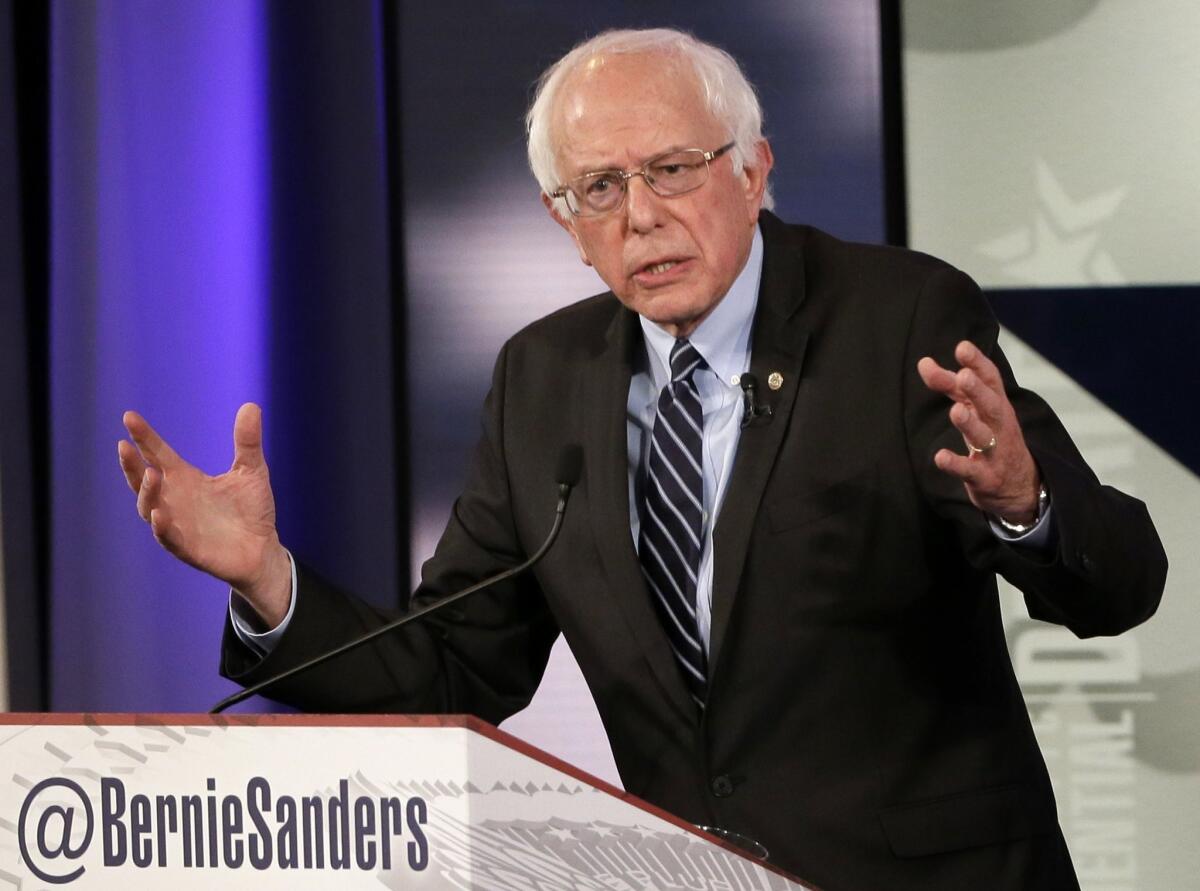Column: Bernie Sanders is a truth-teller, and that’s why we’ll miss him in the race

- Share via
I never supported Bernie Sanders. I believed this year, just as I believed in 2016, that he could not win a general election campaign against a Republican presidential candidate, and that, if by some miracle he did win, he wouldn’t be able to fulfill the broad, sweeping, intoxicating promises of his utopian campaign.
But now that he’s getting out of the race, I already miss him.
Who else will say things like this?
“Not only is it a moral outrage, but it is an ... unsustainable situation when three people in America own more wealth than the bottom half of American society.”
“Healthcare in America should be a right, not a privilege.”
“If you work 40 hours a week, you should not be living in poverty.”
“Our message to the fossil fuel industry, in this country and around the world, is that their short-term profits are not more important than the future of this planet.”
“People in America should not go bankrupt because they have cancer or heart disease. That is a moral outrage.”
Each of these statements is true, obvious and unapologetically stated. And it is no accident that two of them refer to ”moral outrage,” which was at the core of Sanders’ message and, I suspect, of his character. He didn’t display much of a sense of humor, he wasn’t a glad-hander and he didn’t play the game the way it was traditionally played. You wouldn’t really want to have a beer with him. But he wielded his moral outrage like a hammer against his more circumspect opponents. No candidate, not even Elizabeth Warren who was closest to Sanders politically, put things quite as bluntly.
Some critics dismissed him out of hand. Not just because of his radicalism or his anger at the “billionaire class,” but because he made promises it was unlikely he could fulfill in today’s divided, polarized, embittered Washington. Did he really have a chance of undoing Citizens United over the objections of today’s Supreme Court? Of passing “Medicare for all” over the objections of the healthcare lobbies? Of providing free college all around and childcare for everyone?
Even Sanders understood that his bold promises couldn’t be fulfilled in the usual way. That’s why he talked about building a movement, a political revolution that would be so enormous, united and demanding that change would become unstoppable. But despite his popularity on college campuses, he never persuasively showed that he could raise a big enough army for the battle. If he can’t win enough primaries, he certainly can’t start a revolution, and pounding on the podium won’t make it so.
In 2016, when he visited the Los Angeles Times, I asked Sanders how he would be able to accomplish his ambitious agenda when he was sitting across the table from Senate Majority Leader Mitch McConnell (R-Kentucky) and the members of his recalcitrant Republican caucus. Sanders responded: “How do we win? How do we take them on? You take them on when you say, ‘Hey, Mitch, look out the window. There’s a million young people out there now...If you want to vote against this legislation, go for it. But you and some of your friends will not have your seats next election.’ ”
If only it were that easy. Nor was I persuaded that Sanders could beat President Trump, because his radical politics seemed likely to scare off the moderates and swing voters and independents needed to win the election. A cowardly way to decide how to vote? Maybe. But for me, as for so many Democrats, defeating Donald Trump, our worst president in modern history, is the highest priority.
Certainly if Sanders had been elected, his poetry would have given way to prose, as concessions and compromises became necessary to get anything at all done in D.C.
But the poetry mattered. It was exhilarating to hear him talk. No one else cut to the heart of inequity and unfairness as he did. No one spoke up for working people as he did. No one else demanded that we acknowledge the grave societal injustices we usually ignore because it’s easier than addressing them.
Not the supposedly silver-tongued Pete Buttigieg. Not the homespun Amy Klobuchar. Not the fiery Kamala Harris, or the technocrat Mike Bloomberg or even Elizabeth Warren. And not Joe Biden, who is now the last man standing because he appealed to pragmatism, moderation, cautiousness.
@Nick_Goldberg
More to Read
A cure for the common opinion
Get thought-provoking perspectives with our weekly newsletter.
You may occasionally receive promotional content from the Los Angeles Times.











